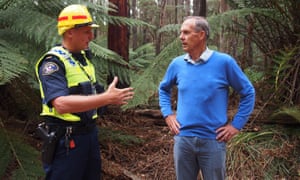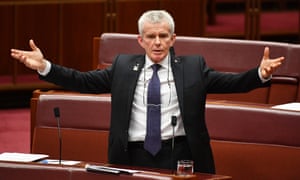The former Australian Greens leader Bob Brown has won a landmark high court fight against Tasmanian anti-protest laws passed in 2014 and under which he was charged in 2016.
Brown, the third person arrested under the Workplaces (Protection from Protesters) Act 2014, argued the laws directly targeted implied freedom of political expression in the constitution and were therefore unconstitutional.
The landmark case stemmed from Brown’s arrest while filming a video about an anti-logging protest at Lapoinya state forest in Tasmania’s north-west in January 2016.
The Tasmanian government dropped the charges against Brown and his co-arrestee, Jessica Hoyt, once they mounted the high court challenge but Brown continued the challenge to protect future environmental actions, arguing they impinged on an implied right to free speech in Australia’s constitution.
In a 183-page judgment, the court ruled in favour of Brown and Hoyt by a six-to-one majority.
The law prohibited protesters from “preventing, hindering or obstructing” businesses, even in public areas such as state forests or the access points to areas where commercial activities are conducted, if they ought to have known the impact their political activity would have on the business.
Speaking after the decision was handed down, Brown told the Guardian it was “a great day for Australian democracy”.
“The high court has said: ‘There is a right to political expression and we will uphold it.’ You can’t just start jailing people on account of their political beliefs or peaceful actions they might take to uphold those beliefs.”
At the hearing in May, Brown’s counsel, Ron Merkel, told the court the law discriminated against protesters by allowing companies to give consent to certain political activities, in effect silencing only those opposed to logging.
Merkel described the law as “unusual” and without precedent in Australia because police powers to order protesters to move on and the automatic ban on them returning for four days were only enlivened when they agitated “political, environmental, social, cultural or economic issues”.
Michael O’Farrell, the solicitor general of Tasmania, explained to the court that charges against Brown had been dropped because police had “misapprehended” the legal status of the area he had been found in, and it was not a business premises or access area.
O’Farrell submitted the law was not designed to ban protests per se but only those who intended to, or could be imputed to have intended, to stop or hinder lawful business activity and successfully had that effect.
He suggested there would be nothing unlawful about protesters holding signs outside a logging area and standing aside to allow vehicles to enter.
O’Farrell accepted the public is allowed to use state forests where their use is “not incompatible” with forestry uses but said that “doesn’t mean Brown and Hoyt have some sort of freestanding right to protest” in the area.
A majority of the court agreed the laws did breach the constitution’s implied freedom of speech. In particular, they ruled that by stopping members of the public from carrying out protests on public lands – “forestry land and related business access areas” – the laws impugned those free speech provisions.
But the court also ruled that aspects of the law that stopped protesters from hindering business activity on business premises were allowable.
Since the Hodgman government introduced the laws after an election promise in Tasmania in 2014, as part of that state’s long-running forestry wars, two other states tried to follow suit.
New South Wales succeeded, introducing laws that imposed a tenfold increase in fines for people protesting against coal seam gas and mining developments and increased penalties to a possible seven years in jail for “hindering the working of equipment belonging to or associated with a mine”.
Both the NSW Bar Association and the Law Society of NSW have attacked the NSW laws, saying they also encroach on rights to free speech implied in the constitution. Three people have been arrested under those laws and pled not guilty to challenge them.
Sue Higginson from the NSW Environmental Defenders Office, who is representing those three arrestees, said the Brown victory was promising for their case, and they would examine it closely to see if it means they have a case to challenge the NSW laws on similar grounds.
The former Western Australian government proposed similar laws but they were not enacted before the March election and have been thrown out by the McGowan government.
Brown said his victory ought to give other state governments pause before introducing similar laws. “The corporate sector seeing it can’t win environmental arguments has got weak politicians to try to knock out the environmentalists and it’s not working,” he said.
The Human Rights Law Centre appeared before the court in support of Brown, and before the decision said it would be important for Australia’s democracy.
“Free political communication and expression and the right to protest are absolutely essential for a healthy, vibrant democracy,” said executive director of the Human Rights Law Centre, Hugh de Kretser. “Tasmania’s laws go too far in shutting down important debate and criminalising peaceful protests.”
“Governments shouldn’t be able to sell off our democratic rights in order to protect business interests,” De Kretser said. “The high court’s decision strikes down key parts of this excessive legislation that led to the arrests that sparked this case. The Tasmanian government should now scrap the legislation entirely.”






View all comments >
comments (263)
Sign in or create your Guardian account to join the discussion.
It's telling that the first thing any Liberal state government does is pass anti protest laws. It's almost as if they don't govern for the people.
The LNP do not govern for the people, their corporate donors, the wealthy and self-interest are far higher priorities for this Government. Almost all their policy decisions reflect this.
"It's almost as if they don't govern for the people"
Have they ever? Not in my lifetime...
No. Sure?
Good on him... really good news. The chopping away of people's rights to stand up against environmental destruction is frightening. if the destruction doesn't stop soon, we'll be living in an infertile and toxic dust bowl while the profits gained from this destruction will be enjoyed off shore. I understand the worry about jobs, but even there the future is in sustainable practices.
One only has to look at Nauru to see what happens to a country that lets rapacious miners strip them of their resources. Nauruans were once the second wealthiest people in the world, and what do they have now? Their present is our future unless Australians wake up to themselves.
Jabba the Cristensen won't be pleased....
But I am! Well done Mr. Brown, and thank you.
Good for you Bob Brown, a true environmental hero, well done mate :)
Bob Brown is a damn hero
Also a dam hero!
Brilliant comment.. ��
Well done Bob.
The free people of this Nation will be forever indebted to you.
Good on you Bob
Good decisions... by Brown to challenge, and by the High Court.
Well done and congrats Bob. Tasmania would be a poorer and browner place without you. Keep up the good fight.
Good on Bob Brown, a win for common sense and the enviroment!*!*
One step away from the state of Trumpmania.
Hooray!!
The Liberals want to make people fearful, with their War on Terror BS, while taking away political freedoms. They have to be stopped.
Too right. And it should have happened last election.
Why on earth should people be allowed to protest against corporations cutting down the forests? Whatever next? People being allowed to protest against fracking and mining just because it drains the million year old creeks in the Blue Mountains? People having a say in the dredging of the barrier reef? Think of where it might end!
Yes, shocking news indeed. Hopefully the regime will put a stop to such travesty ASAP. With the new facial recognition technology, it will be easy to identify gatherings of non-related individuals, and any group of more than three will be forcibly dispersed!
I'd suggest we disperse groups of more than one. Or more than none really, to be absolutely safe.
A fleet of Peter Dutton-shaped drones buzzing low over the forest with facial recognition cameras hidden in their anuses ought to be implemented first thing.
What a totally loathsome image. The would be fuhrer's likeness floating above us all.
Thanks Bob
Please come back Bob. Your country needs you.
Congratulations Bob Brown, a true champion of human rights!
Retired, yet still fighting the good fight for the right to protest. Regardless of his stance on Lee Rhiannon and his dismissal of socialist politics, which I disagree with, Bob remains a man of principle and fortitude. Proud to have been raised in the state he represented.
I am proud to have been assaulted by the same dumb thugs from Queenstown on the same day as Bob during the Franklin blockade!
You should watch the recent 4 corners on Lee Rhiannon. Her only supporters are her mates and her so-called 'grassroot movement'. Everyone else who has worked with her for decades have lined up to tell the world who she really is.
Her cult leadership reminds me of Scientology's founder Hubbard. Even started her own extremist group 'Left Renewal'. Extremely glad that I'm not in NSW, so I could donate and support the Greens with conscience.
Sent too soon, here's the link ^_^ http://www.abc.net.au/4corners/inside-the-greens:-a-party-in-turmoil/8794660
Brown: proudly green, red, pink but never yellow.
Not sure about red, but the other colours work for the ever wonderful Bob.
Oh, rainbow colours in fact, both for the more recent co-option by gay rights and the older use by peaceniks.
Onya Bob.
Bob strikes back. The dark overlord returns to its lair to confir with thier corporate backers to intrduce the next laws to stifle the citizens dissent.
This is an awesome and hugely important win. Good work!
Thank you Bob Brown for challenging tese unjust and anti democratic laws. Only tinpot dictators believe they should be free from criticism and protest.
Good news! Well done
Bob Brown for standing up to the sods trying to create a police state for the benefit of corporate interests.
Its called fascism and we're breathing and eating it everyday while this coalition rabble rule.
Too right. The Adani mine protests are only just warming up and the Canavans and other nutters want federal laws like the Tassie laws to stifle resistance. Many of the Liberal bastards are in the pockets of big business and mining and don't give a fuck about ordinary Aussies.
My most disliked pollie is that big,fat bag of shite currently BLUDGING in the USA, namely 'big Joe'. He hated wind turbines. Why? Donations, dear boy, donations.
Bob is looking like becoming a saint.
To many of us he already is. Good job Bob and three cheers for the constitution!
Three cheers for the High Court (the constitution doesn't actually cover freedom of speech)
The great thing about this decision is that it appears to extend the definition of "political communication", which was originally enunciated by the HC in relation to political TV advertising, to protect political protests as well. It will be interesting to see how this plays out when, for example, unions march against industrial relations reform, or groups like Occupy conduct sit-ins. Would sending in the police against such groups, which happens routinely, now be illegal?
Sign in or create your Guardian account to recommend a comment